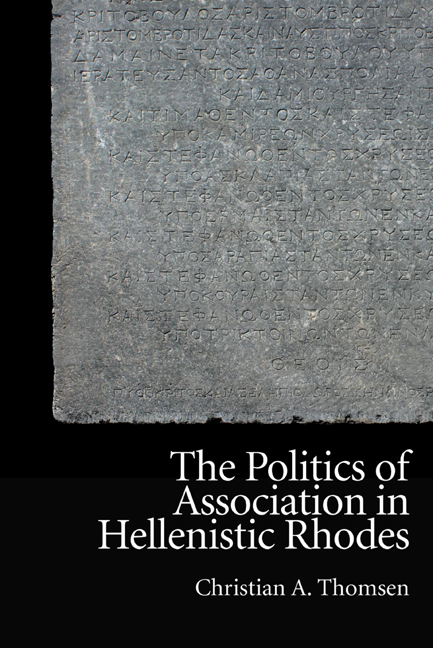Book contents
- Frontmatter
- Contents
- List of Tables and Figures
- Acknowledgements
- Abbreviations of Epigraphic Corpora
- Maps
- 1 Introduction
- 2 Rhodian Democracy
- 3 The Oikos
- 4 Public Associations
- 5 Private Associations
- 6 Private Associations and Human Resources
- 7 The Civic Aspirations of Private Associations
- 8 The Corporate Polis
- Bibliography
- Index Locorum
- General Index
5 - Private Associations
Published online by Cambridge University Press: 08 October 2020
- Frontmatter
- Contents
- List of Tables and Figures
- Acknowledgements
- Abbreviations of Epigraphic Corpora
- Maps
- 1 Introduction
- 2 Rhodian Democracy
- 3 The Oikos
- 4 Public Associations
- 5 Private Associations
- 6 Private Associations and Human Resources
- 7 The Civic Aspirations of Private Associations
- 8 The Corporate Polis
- Bibliography
- Index Locorum
- General Index
Summary
From the public subdivisions we move now out of the state sphere and into the social, to private associations. From the late third century BCE to the early first centuryce, the period with which we are dealing, Rhodes was home to about 200 private associations that we know of. To judge from their names, the associations were primarily concerned with cult, and therefore commonly known as ‘religious associations’ among modern historians. In the following chapters the associations’ relationship with the Rhodian magisterial elite will come to the centre of the discussion, and we will see how associations became part of an elite strategy and helped shaped politics in the Rhodian state. But before we get to that we must first take a look at the internal organisation of the many private associations of Rhodes.
A comprehensive survey of Rhodian associations, however, is confronted by two problems. First, most private associations in Rhodes are known to us simply as names, most employing a theophoric element, such as the Asklapiastai, or compounds, such as the Meniastai Aphrodisiastai, while on occasion incorporating ethnic or professional elements. Secondly, those same names combined with other evidence indicate profound differences in membership, activity and intensity.
Traditional scholarship about private associations in the Greek world constructed elaborate typologies of associations: cultic, professional, ethnic and more, often based solely on the names of associations. More recent scholarship, however, has largely abandoned this approach, emphasising instead the various pre-existing networks that coalesced in the associations.
A mid-second-century Rhodian association provides a case in point. To judge from the name, the Asklapiastai Nikasioneioi Olympiastai might be understood simply as a group of devotees of Asklapios (and of the Olympian gods) and left at that, but the chance survival of a list containing the names of a subset of the members – namely those who were also its benefactors – allows us a more detailed look at a subsection of the members: the association had been founded by a certain Nikasion of Kyzikos, and he and his immediate family seem to have formed the nucleus of the group. Both his sons, his daughter and five grandchildren were listed, as was his wife, Olympias, whose name should probably be recognised as the root of the name Olympiastai.
- Type
- Chapter
- Information
- The Politics of Association in Hellenistic Rhodes , pp. 89 - 104Publisher: Edinburgh University PressPrint publication year: 2020



